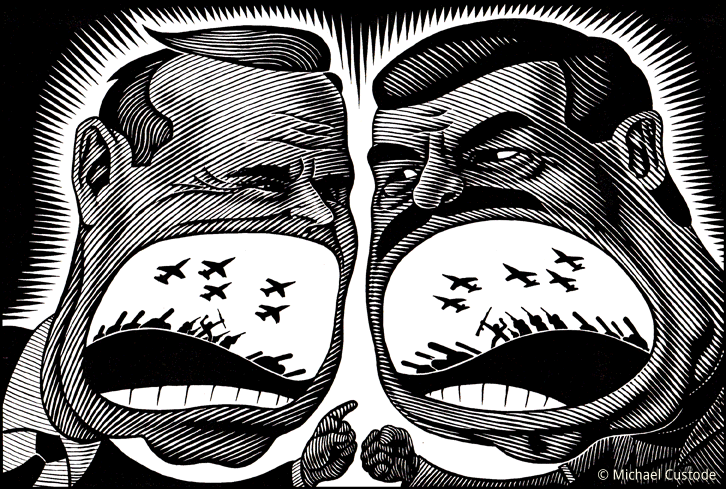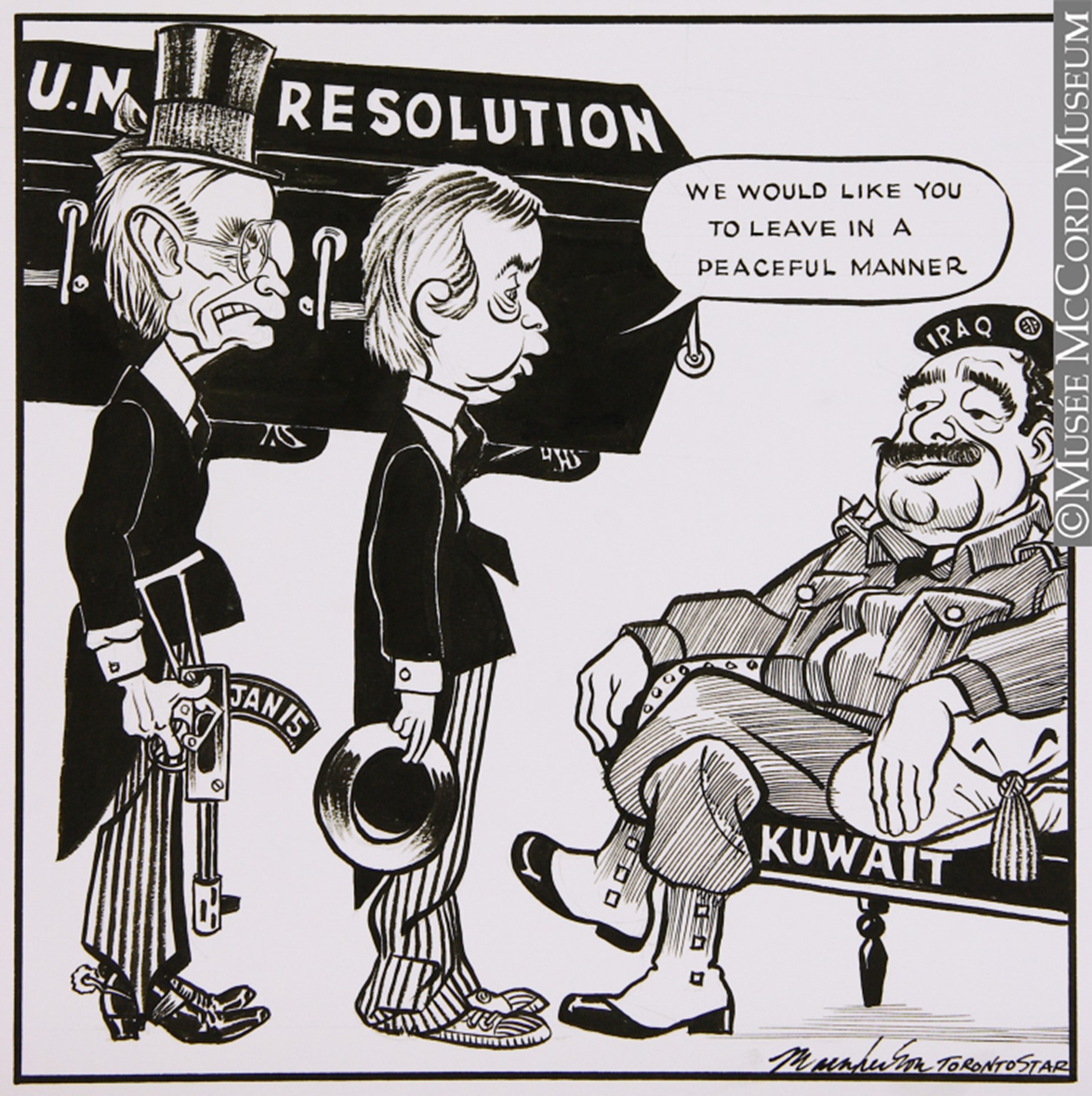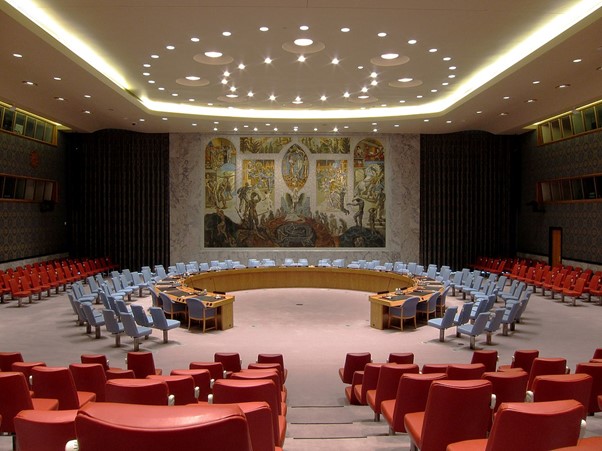

Table of Contents
Introduction
The United Nations is an international organization that was created to uphold peace and encourage good international relations and cooperation. It was supposed to bring harmony among the nations of the world and lead them to a future where there were no more wars. However, like all human creations, its structure and administration have flaws while the utility of the UN always relied upon the imperfect humans that constitute it. One of the questionable moments in the history of the United Nations was sanctioning of the First Gulf War.
The onset of the war and international response
Saddam’s miscalculation in Kuwait
Before delving into how the United Nations, or more precisely the Security Council (SC), dealt with the Iraqi invasion it is important to shortly explain the Iraqi invasion of Kuwait. In a decade before the incursion, Iraq was involved in a prolonged and costly war against Iran, leaving it indebted and economically weakened. The regime of now-infamous Saddam Hussein was shaken and it had to find a way out of the ensuing crisis. The only real income of Iraq was from the oil exports, but the prices were unstable. From the Iraqi perspective, it was at least partially Kuwait’s fault for overproducing, while their relations were further strained by the fact that the majority of its debts were owed to Kuwait and Saudi Arabia. Exploiting lingering territorial claims on Kuwait and the sense of national resentment, Saddam began priming his people for another war, trying to pressure Iraq’s southern neighbor for erasing the debt and financial aid. Unsurprisingly, Kuwait refused to buckle, giving Iraq a pretense for an attack.
However, Saddam Hussein made a crucial mistake in predicting the international response. As the Cold War was still lingering, though slowly ending, he was sure that USSR, Iraq’s traditional ally, would back him enough, especially as Kuwait was heavily tied with the US. In contrast, he also believed that the US was still boggled with the “Vietnam syndrome” and would abstain from direct interference. Furthermore, during the Iraq-Iran war, he created tangible ties with Washington, adding to his sense of security. Finally, Iraqi leadership calculated that the Arab League would stop any foreign intervention in the region, giving them enough room to achieve at least some of their goals. Unfortunately for them, all of these presumptions were wrong.
Immediate worldwide reactions
First of all, most of the Arabs voiced their opposition to Iraq’s invasion. Though initially against western intervention, within a few days after the occupation of Kuwait, Saudi Arabia invited the US and its allies to station armed forces on their territory, while a similar request was sent to members of the Arab League. The Soviets were also dissatisfied with Saddam’s actions as they weren’t consulted nor were they in a position to do much about it as the USSR was slowly disintegrating. Thus, Gorbachev tried to negotiate with the Iraqis in an attempt to avoid the need for military intervention. It was an attempt to save their face as a major power and preserve their supposed ally. Similarly, French President Mitterand attempted to find a peaceful solution. Some other Arab leaders also tried to influence Saddam, but all these peace talks failed as none were able to offer the Iraqis any palpable gains for their growing crisis.

A caricature of George Bush Sr. (left) and Saddam Hussein (right) and their military rhetoric during the build-up to the First Gulf War. custode.com
In contrast with those, the US and to a certain extent Britain approached the issue quite aggressively. Their position was similar to “no negotiating with terrorists”. They told Saddam to withdraw or face the consequences. Thus, though they justified the deployment of troops in Saudi Arabia as protecting another of their allies, it looked more like preparing for war. It seemed that the US was prepared to show the world all of its might, shaking off the legacy of Vietnam, However, this time its leadership, headed by President George Bush Sr., was determined to go through the “proper” United Nations channels to legitimize their action. This was done to preserve a public image of a just intervention, trying to avoid a wider condemnation like on from the Vietnam War era.
The role of the United Nations Security Council
From a peaceful solution to the war
The Iraqi invasion began on August 2nd 1990 and the UN immediately reacted issuing Resolution 660 the very same day merely condemning the act of aggression. Its further actions paralleled the direct negotiations between Iraq and other nations. However, while these talks remained peace-oriented, the United Nations began to exert pressure and assumed a growingly hostile stance towards Iraq. It began with Resolution 661, enacted 3 days after the invasion. It ratified economic sanctions on Iraq. By August 25th, Security Council adopted Resolution 665, allowing a naval blockade to enforce the sanctions. This act raised first questions over the actions of the UN. Resolution 665 in essence permitted the United States and Great Britain to use force to enact the economic restriction, something that for some violated the international law that the UN was supposed to uphold.
Nevertheless, the US and Britain continued to voice their belief that military action was necessary. It seemed that the two allies were preparing for war and that they were just lobbying for it. That wouldn’t be so surprising if the SC wasn’t following their rise in aggressivity. The first notable step in that direction came with Resolution 674 from late October. It stated that “the Council will need to take further measures” if Iraq doesn’t comply with the demands. As Saddam ignored the threats, the US managed to influence the members of the Security Council to pass Resolution 678 in late November. It was a de facto ultimatum to Iraq, stating that if its troops don’t withdraw by January 15th, the UN grants rights to the forming coalition to use all necessary means to liberate Kuwait. It was almost a delayed declaration of war against Iraq.

A caricature of Resolution 678, depicting the resolution as a prepared coffin. collections.musee-mccord
The legality of UN actions
The majority of the world population saw the entire progression as lawful and righteous. The international society had to act to preserve Kuwait from being annexed by Iraq. However, there were some critics of how the SC handled the issue. The most common criticism was that the United Nations acted too quickly, without leaving enough time for a peaceful solution. It was seen as overaggressive, going completely against its founding principles. Yet, in reality, its founding charter never stipulated any chronological constraints in its reaction time. Thus, from that perspective, the Security Council had the right to act whenever it saw fit. One can even argue that possibility of war crimes and mistreatment of the occupied Kuwaitis was reason enough to hasten the action.
More serious criticism was aimed at the UN’s right to use force. The founding crater does provide the Security Council to take enforcement action but presumes it was to be done by the UN peacekeeping troops. However, Resolution 678 gave said rights to a coalition led by the United States. For many jurists, this breached the founding charter as the delegation of power was never stipulated. Furthermore, such deputized military action has been considered a halfway between the unilateral use of force by states and collective security that was part of the UN goal. It also posed a question of accountability and control of the forces used to enforce peace, as the SC had only limited influence on the coalition actions.
Another legal issue was the voting count for the resolution. It was passed with two opposing votes and an abstention from China. This is important because the UN charter states that the decisions of the Security Council need to have affirmative votes of at least 9 out of 15 members, including concurring votes of all 5 of the permanent members. China, as a permanent member, abstained, posing the question if such a vote counts as concurring or more like a veto. The latter interpretation would make Resolution 678 void and the coalition military action illegal.
Ethics and morality behind the use of force
Persuasion or bribery?
Considering the ambiguity of the letter of law, the legal aspects of the UN actions in regards to the Gulf War remain debatable. However, they also pose some moral and ethical questions. Probably most problematic was the ethical issue of the US influencing the votes of the Security Council members. From the onset of the crisis, it looked like Washington was determined to go to war and it was prepared to do whatever it took to achieve it. Thus, it employed so-called “sticks and carrots” diplomacy towards other SC members. For the Americans, it was most important to secure Soviet and Chinese votes. For the former, it was enough to secure some $7 billion in aid from several US-pressured nations and substantial food shipments from the United States. To win over China, a nation traditionally against any kind of interventionism, Washington promised to refrain from any criticism of the Tiananmen Square massacre, further sweetened with a substantial World Bank loan.

The Security Council meeting room in the UN headquarters
Other members like Zair (today DR Kongo), Egypt, Ethiopia, Saudi Arabia, or Turkey were offered either some kind of debt expunging or some kind of economic investments and deals. Notable deals were struck with Syria and Iran, both of which were considered hostile nations by the US. Despite that, Iran was rewarded with its first World Bank loan since the 1979 Islamic Revolution. Similarly, Syria was offered military assistance in scope of around $1 billion worth of arms and aid. On the part of the stick influence, Ecuador was warned by Washington of the “devastating economic consequence”’ of it voted no. A similar financial threat was given to Zimbabwe. These nations buckled, unlike Cuba and Yemen, both of which felt the same pressure. Especially questionable was the fact that within days after the vote, the US had blocked its $70 million aid to Yemen, backed with similar moves from the World Bank and the IMF, disregarding the fact that it was one of the poorest nations in the world, always on the verge of hunger and starvation.
Power and consensus
Another ethical issue was that the resolution gave authorization for “all necessary means”, but without stipulating who was to determine what is necessary. An additional question was could there be other courses of action before committing to the use of force? It seemed that for most people the wording implied military actions, while it was presumed that the decision to use it would rest in the hands of the collation leader – the United States. Such unilateral decision-making went against the supposed moral fiber of the UN but was in line with the position that the US held at the time. The Soviet Union was nearing its breakup, China was still far from the influence it wields today. There was only one true superpower at the time and it could flex its political, diplomatic, and military muscles as it pleased. After all, the kind of intervention done against Iraq in the First Gulf War was a clear example that by then the Cold War was over and the US was the winner.
Nevertheless, despite all the dubious activities behind the scenes which make the United States intervention in Iraq more than questionable on various planes, it would be wrong to present them as solely Washington’s machinations. Unlike the Vietnam War, the US had a much wider public support for its actions, both within and abroad. Saddam’s actions were condemned by almost all states and he had no real allies, despite trying to link the issue with the Israeli-Palestine conflict. Thus, in the end, not many people really made any fuss about slight manipulations and bending of the rules done in favor of enforcing peace with force. There was more than palpable international consensus that Iraq deserved the punishment for its aggression.
In that vein, even most of those who raised issues about how the UN dealt with the invasion of Kuwait wasn’t questioning if the military intervention was a right call or not. For them, the main issue was precedent such actions made. First of all, it exampled UN’s departure from its peaceful demeanor, though some applauded the speedy reaction to a crisis. It also showed that the Security Council votes could essentially be bought and that there weren’t any means to combat it. Finally, it opened the door for future United States unilateral interventionism. However, unlike later military involvements in Iraq and Afghanistan, the US action in the First Gulf War was conducted quickly and without any prolonged occupation, leaving it one of its best executed military and political achievements of recent history.
